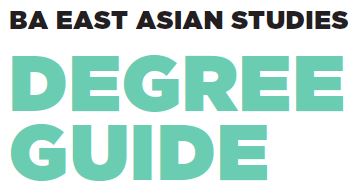Major, Minor and Honors
Undergraduate Degree Programs in East Asian Studies
There are two types of Bachelor's degrees available through the Department at present:
- Bachelor of Arts - Major or Minor in East Asian Studies
- Bachelor of Arts - Honors program in East Asian Studies
These degrees offer many different areas of study. Prospective students are asked to contact the Department for information, advice and program planning.
Check out the East Asian Studies Major Degree Guide!
- EASIA 101 - Understanding East Asia
Senior Level Courses
A minimum of 30 units to a maximum of 48 units at the senior level from EASIA, CHINA, JAPAN, or KOREA, including:
- 12 units in EASIA at the senior level, 6 units of which must be at the 400 level
and
- 9 units in CHINA at the senior level including CHINA 341 and at least one of CHINA 302, CHINA 401, CHINA 402 or
- 9 units in JAPAN at the senior level including JAPAN 341 and at least one of JAPAN 302, JAPAN 401, JAPAN 402 or
- 9 in KOREA at the senior level including KOREA 302 and at least one of KOREA 401, KOREA 402
- Related East Asian content courses may be taken as options, or applied to the major to a maximum of 9 units. These will be in addition to, not in place of, the requirements above.
- The list of related East Asian content courses is available here.
A minor in East Asian Studies requires EASIA 101 and a minimum of 15 to a maximum of 42 at the senior level from EASIA, CHINA, JAPAN, or KOREA, 6 must be at the 300 or 400 level. Additional program requirements for the BA degree are outlined in the University Calendar.
Note: The minor in East Asian Studies may not be combined with the major in East Asian Studies.
Honors
Students planning to apply for admission to the Honors program should consult General Admissions Requirements for BA Honors. See Bachelor of Arts (Honors) for Faculty regulations concerning the Honors program.
Honors in East Asian Studies requires EASIA 101 and a minimum of *48 to a maximum of *60 at the senior level in EASIA, CHINA, JAPAN, KOREA, including:
- *6 in CHINA 402 and 341; or, *6 in JAPAN 402 and 341; or,*3 in KOREA 402;
- *12 in EASIA at the senior level, including *6 in EASIA at the 400 level, excluding EASIA 480 and 490;
- EASIA 480, the Honors Seminar;
- EASIA 490, Honors thesis, to be written under the supervision of an advisor appointed by the Department.
Note: The list of related East Asian content courses is available here.
Graduation with Honors requires a GPA of at least 3.0 with an average of at least 3.3 in all courses applied to the major. Graduation with First Class Honors requires a GPA of at least 3.7 in all senior courses applied to the major and a GPA of at least 3.5 or better on the last 30 completed.
Combined Honors in East Asian Studies and one other discipline
For common requirements in these Combined Honors programs refer to Bachelor of Arts (Honors).
The Combined Honors in East Asian Studies and one other discipline requires EASIA 101 and a minimum of *36 at the senior level in EASIA, CHINA, JAPAN, KOREA, including:
- *6 in CHINA 402 and 341; or, *6 in JAPAN 402 and 341; or, *3 in KOREA 402;
- *12 in senior-level EASIA, including *6 in EASIA at the 400 level excluding EASIA 480 and 490;
- A minimum of *36 in the other discipline, meeting the requirements specific to that program.
- EASIA 480, the Honors Seminar, or an equivalent class in the other discipline;
- EASIA 490, Honors thesis, to be written under the supervision of an advisor appointed by the Department.
In a combined honors program, students must meet the promotion and graduation standards of each department.
Admission Criteria
Any student who qualifies for admission to the Faculty of Arts is eligible for any of the programs described here. Potential Arts students who lack a language other than English at the matriculation level may use Chinese, Japanese or Korean to satisfy the requirement. Students registered in other faculties or departments are also encouraged to take Chinese, Japanese or Korean to complete language requirements, for their general interest, or to serve as a tool in their various careers.Placement in Language Courses
The Department reserves the right to place students in the language course appropriate to their level of study. Students assessed by the Department as having a prior language proficiency beyond 400-level will be required to pursue a different language for the major. More information on language screening in the Department can be found in each language section.
Chinese, Japanese, or Koran as LOE requirement
Chinese, Japanese or Korean may be used by students to satisfy the Language Other than English (LOE) requirement of their degree or program. Courses that DO NOT satisfy the LOE requirement for the BA degree are those dealing with culture or literature taught exclusively in English, which generally have the subject code EASIA.All language courses integrate the development of the four language skills of listening, speaking, reading and writing. The spoken language together with written composition continues through all levels. Senior courses in reading are conducted in the spoken language.
It should be noted that courses in this Department are primarily designed for students who do NOT speak and who are NOT literate in the language in question. This generally includes dialect speakers as well. Those courses which are open to all students are appropriately marked in the "Details of Courses" section of the University Calendar. It should also be noted that there are special routes for students with background in one of the languages. These students should consult with the Department before making course selections.
